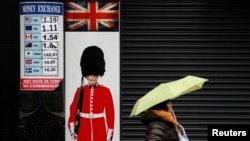The British pound fell to a three-month low on Monday amid reports Prime Minister Theresa May is about to set the U.K. on the road to a clean break with the European Union, pushing the country into uncertain economic territory.
The currency fell below $1.20 before recovering slightly. It has lost about a fifth of its value since Britain voted in June to leave the EU.
May is due to disclose details of Britain's exit plans in a speech on Tuesday. Her office says she will call for a "global Britain" that's open to the world.
Some British media say she'll signal a willingness to take the U.K. out of the EU's single market in goods and services in order to gain control over immigration. EU leaders say Britain can't have single market access without allowing free movement of people from the bloc.
The prospect of losing privileged access to the EU market alarms many in Britain's huge financial services sector, which relies on being able to do business seamlessly across the 28-nation bloc.
It also worries the many foreign firms who use London not only as a financial hub but as an entry point into the EU.
"It's looking more and more like a 'hard' Brexit is in the offing and markets are responding," said Neil Wilson, senior market analyst at ETX Capital.
"We now have to assume May will prioritize immigration controls and the price to pay will be to exit the single market. That could send the pound a lot lower still, perhaps towards $1.10 in the coming weeks."
The pound's recovery from below $1.20 came after U.S. President-elect Donald Trump's comment in an interview with The Times of London that a U.S.-U.K.-trade deal could be done "very quickly" once he takes office this week.
British Foreign Secretary Boris Johnson said it is "very good news that the United States of America wants to do a good free trade deal with us and wants to do it very fast."
May has said for months that she will invoke Article 50 of the EU's key treaty, formally beginning the process of negotiating Britain's departure, by March 31.
But she has refused to reveal details about the government's goals or negotiating strategy, arguing that to do so would weaken Britain's hand. That lack of clarity has fueled allegations that her Conservative government's plans are in disarray - and has led media and markets to seize hungrily on every hint and nuance.
British Treasury chief Philip Hammond also fueled speculation that Britain will play hardball in Brexit negotiations. He told Germany's Welt am Sonntag newspaper that Britain hoped to retain single-market access, but would be willing to "change our economic model to regain competitiveness" if that was cut off.
Opposition Labour Party leader Jeremy Corbyn accused Hammond of threatening a "trade war with Europe."
Pound Sags Amid 'Hard Brexit' Signals Ahead of May Speech

LONDON —



